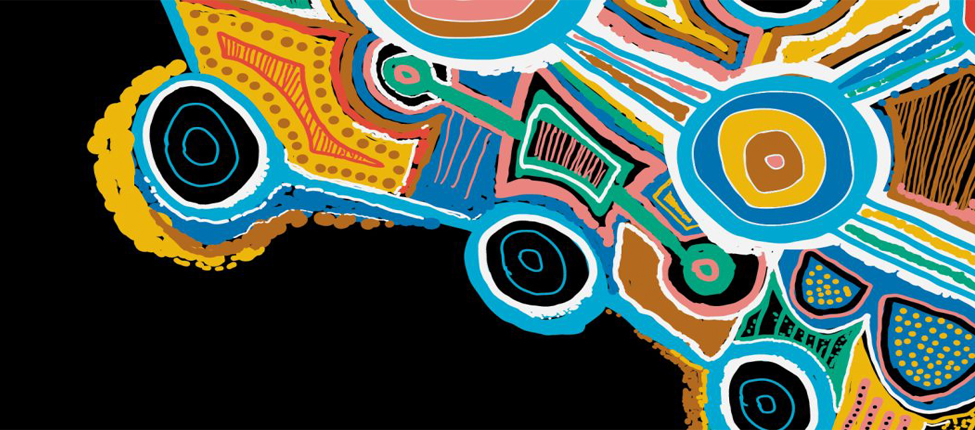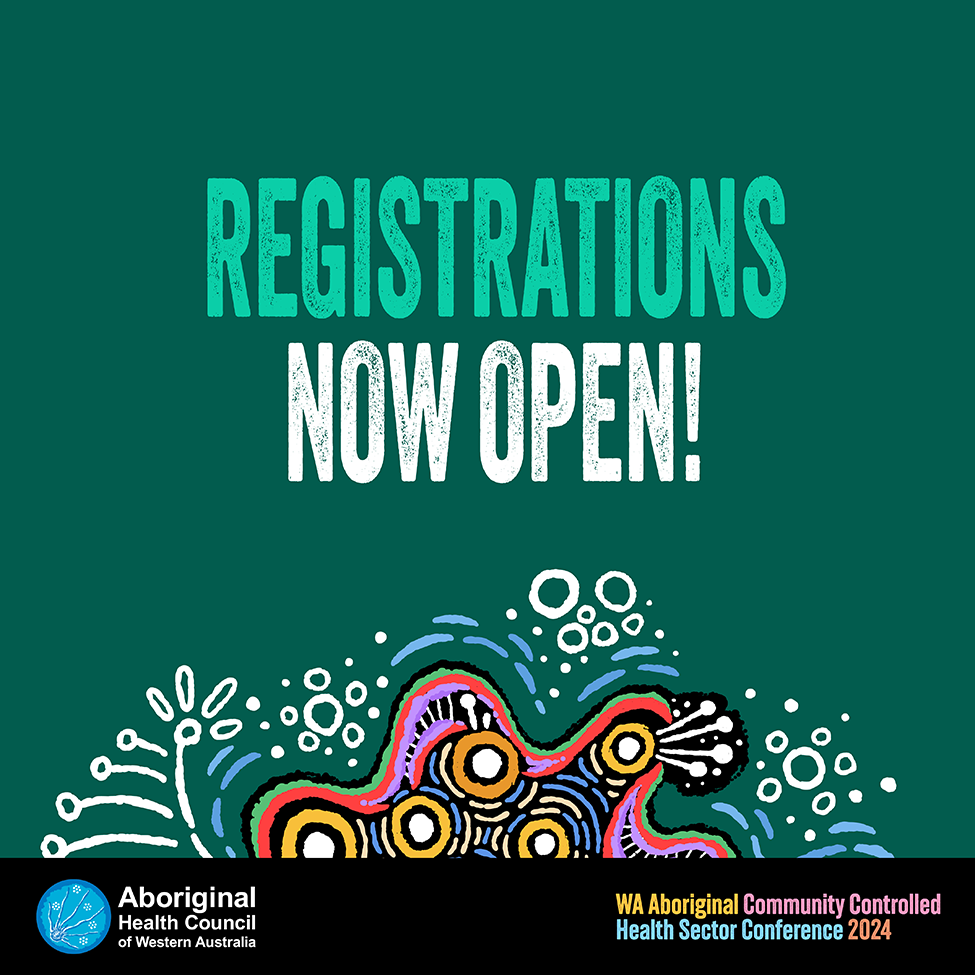Chief Executive Officer’s Message
Kaya everyone,
This month, we marked National Close the Gap Day, an important day to reflect on the ongoing work and dedication of our Aboriginal Community-Controlled Health Services (ACCHS) Sector and what lies ahead. The day puts an important spotlight on the vast disparities between Aboriginal and the wider Australian population. Yet despite this, our communities continue to show tremendous strength, playing a fundamental role to closing the gap in health and social outcomes for Aboriginal people.
As the peak body for the ACCHS sector in WA, AHCWA has been advocating for transformation across mainstream health systems and policies, seeking recognition for the remarkable achievements of Member Services in delivering the ACCHS Model of Care to improve the health and wellbeing of Aboriginal communities across the state.
AHCWA pays tribute to the journey of establishing the National Agreement on Closing the Gap to make it what it is today; implementing new ways of working to drive what is needed to overcome entrenched inequality. Our sector is committed as ever in ensuring its success and accountability, however we recognise that this will only be possible with Governments full commitment, accountability and implementation of the four Priority Reforms, as highlighted in the recently released Productivity Commission report.
In recognition of this year’s theme for National Close the Gap Day, AHCWA looks forward to continued efforts towards Voice, Treaty and Truth, and commits, with Government, to a strategic and authentic approach that shares decision-making with our communities and achieves greater outcomes.
Sincerely
AHCWA CEO, Des Martin
Don’t Miss Out! WA Aboriginal Community Controlled Health Sector Conference 2024 registrations close Friday April 5!
Dive into the heart of the Aboriginal Health Sector and connect with your mob, health specialists and communities. Prepare for an exciting time as we explore diverse health topics and services across WA.
Plus, hear from government speakers and NACCHO to learn about future directions in funding and programs. And don’t forget there is an exciting Youth Conference.
2024 WA Aboriginal Youth Conference: Monday, 29 April 2024
AHCWA Member’s only Forum: Tuesday 30 April 2024
2024 State Sector Conference: Wednesday, 1 May, and Thursday, 2 May 2024
Where? The Esplanade Hotel in Fremantle.
We can’t wait to see you there!
Culture Care Connect
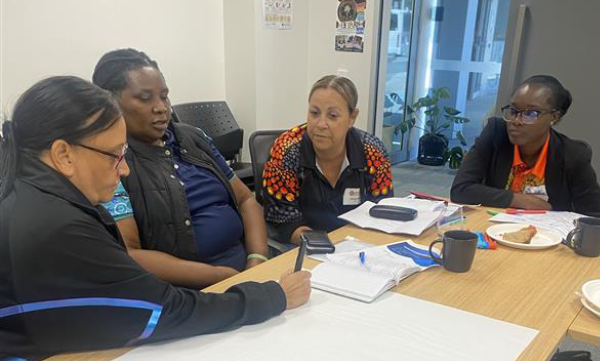
The CCC teams from Kimberley Aboriginal Medical Services, Pilbara Aboriginal Health Alliance, Moorditj Koort, Derbarl Yerrigan Health Service, and Bega Garnbirringu Health Service convened in Perth from March 12th to March 15th, 2024, marking the inaugural WA CCC Gathering hosted at the AHCWA offices.
On the first day, the CCC Network Coordinators met to explore ways the regions could contribute to developing the WA Jurisdictional Suicide Prevention Plan. Emphasising the significance of consultation and co-design led by local leaders, following cultural protocols and planning processes, the team conducted a preliminary desktop review of existing WA State and Regional Suicide Prevention Plans. Additionally, the CCC NACCHO team presented a video session supporting the development of the WA Jurisdictional Suicide Prevention Plan.
Day two commenced with each CCC site sharing insights into developing their respective models of care, exchanging knowledge, highlighting successes, and addressing challenges.
The Mental Health Commission Community Liaison Officers (CLO) Program engaged with the CCC Network Coordinators and Aftercare Workers to explore potential areas of collaboration and exchange ideas. Puntukurnu Aboriginal Medical Service and Pilbara Aboriginal Health Alliance delivered a presentation titled “Collaboration for Effective Suicide Prevention” focusing on the Pilbara Region. The presentation shed light on the Pilbara Suicide Peer Network and emphasised the collaborative efforts of all stakeholders in suicide prevention within the region.
On days two and three, the CLO and CCC teams were joined by SEWB and FDV teams from South West Aboriginal Medical Service and Yura Yungi Aboriginal Medical Service for Indigenous Applied Suicide Intervention Skills Training (I-ASIST).
During the two-day I-ASIST sessions, the culturally relevant framework enabled participants to learn to utilise a unique 6-task model for suicide first-aid intervention, collaborate with individuals to develop personalised safety plans, and connect them with further support. These skills are crucial for fostering a suicide-safer community across the state.
Special recognition goes to Kesi-Maree Prior at PAHA and Mark Bateman at Moorditj Koort for their leadership in facilitating and supporting the development of the CCC Gathering. The CCC team has gathered valuable insights and identified key actions to implement in the coming months. PAHA and KAMs will present at the AHCWA State Sector Conference on the CCC rollout in their regions.
‘Game Changer’ immunisation for thousands of WA babies
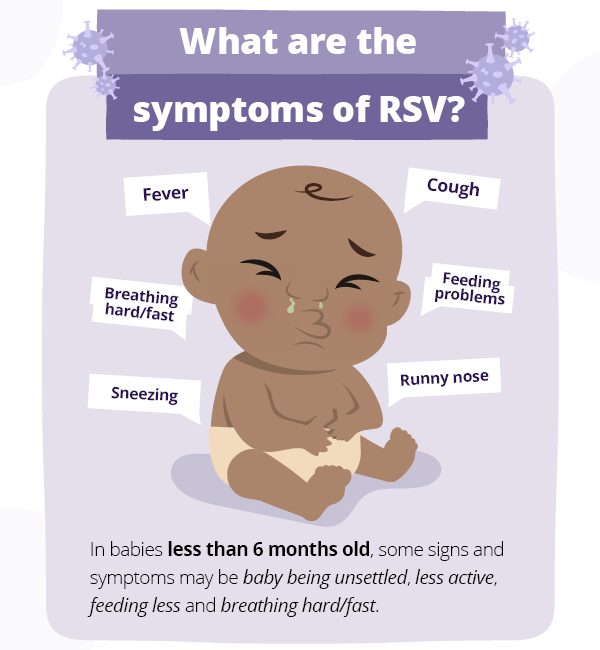
Earlier in March Western Australia announced a state government-funded immunisation program against Respiratory Syncytial Virus (RSV). It was the first Australian state or territory to do so. All babies under eight months old and those aged eight to 19 months at increased risk of severe RSV infection will be eligible for the immunisation in WA this year. RSV can cause serious illness in children, and news headlines have welcomed WA’s impending rollout. Infants in their first year of life are at highest risk. RSV can also have long-lasting effects on children with RSV in early life associated with subsequent childhood asthma.
An immunisation is now available to protect babies from RSV. This provides long-acting antibodies (known as “monoclonal antibodies”), delivered by injection to young children to protect them from becoming sick with RSV. This is what will be offered in WA. Nirsevimab (also known as Beyfortus) is a long-acting antibody that Australia’s Therapeutic Goods Administration (TGA) approved in November 2023. Nirsevimab binds specifically to RSV and remains in the body for up to five months after injection. In a key clinical trial nirsevimab was shown to reduce RSV lower respiratory tract infections requiring medical attention by about 79%. Several European countries and the USA have recently implemented infant programs with nirsevimab and are reporting significantly lower RSV hospitalisation rates in babies. RSV is the most common cause of respiratory infection in young children. By the age of two, almost all children show evidence they’ve been exposed to the virus. Free access to an immunisation against RSV should significantly benefit young children and families in WA, keeping children out of hospital this winter.
Ordering for nirsevimab open Tuesday, April 2
Providers offering infant immunisation services are eligible to order government-funded nirsevimab for the WA RSV Infant Immunisation Program.
Eligible providers were offered a pre-allocation of nirsevimab doses to commence the catch-up program.
Additional immunisation doses will be available to order through Onelink from 10:00 AM on 2 April 2024.
For more information please visit this page.
Rural Health Excellence Awards Winners
We’re thrilled to share the remarkable achievements from the recent Rural Health Excellence Awards. Three outstanding Health Professionals connected to our Member Services have won esteemed awards.
Remarkable accomplishments: these awards are a true testament to the quality of professional and compassionate healthcare to the community.
We extend our heartfelt congratulations to:
Michele Harvey (OVAHS) Nurse or Midwife of the Year.
Tia Brand-Williams (PAMS) Young Professional of the Year.
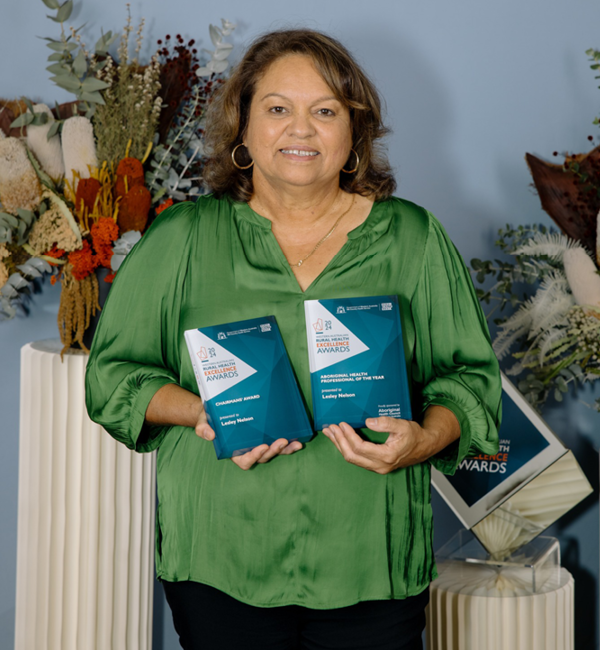
Lesley Nelson (CEO SWAMS) Aboriginal Health Professional of the Year. (sponsored by AHCWA)
These annual awards, hosted by WA Country Health Service and Rural Health West, celebrate the most dedicated and compassionate clinicians of rural healthcare. A panel of clinicians and representatives from rural and health organisations were responsible for selecting shortlisting the finalists and selecting the winners.
Congratulations to all the winners and finalists for their outstanding contributions!
PAMS Celebrate their 30th Anniversary
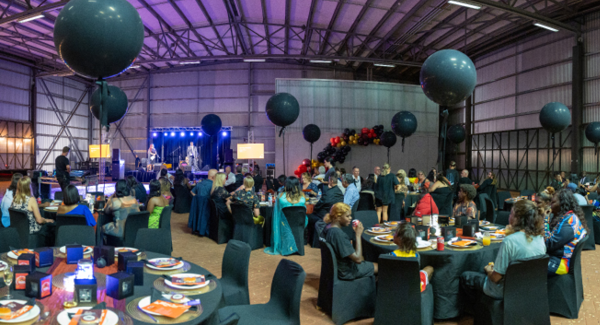
Puntukurnu Aboriginal Medical Service (PAMS) celebrated a significant milestone in February, marking 30 years of dedicated service. The occasion brought together the Board of Directors, CEO, staff, and community members for a memorable celebration.
On Friday, the community and staff enjoyed a family-friendly event filled with music, a juice bike, delicious food, face painting, coffee, and three water slides to beat the Pilbara Summer heat.
The festivities continued on Saturday with a more formal gathering, where stakeholders, the Board of Directors, the CEO, staff, and Community Elders came together for an evening filled with laughter, delectable food, and live music from Lilly Gogos and her Band.
Our Doctors – Ngalla Bidi – Our Pathway
AHCWA sets up a bursary fund to assist Western Australian Indigenous Medical Students on their journey towards becoming Doctors.
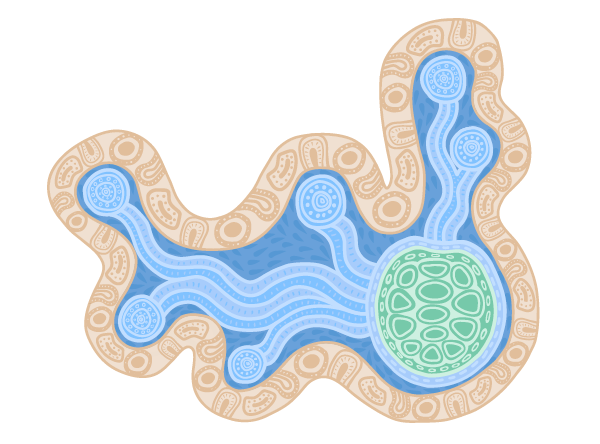
The PRIDoC Bursary, Our Doctors Ngalla Bidi Our Pathway, supports students in attending the Pacific Region Aboriginal Doctors Congress (PRIDoC).
AHCWA’s Chairperson Vicki O’Donnell OAM says Our Doctors ‘Ngalla Bidi’ Our Pathway is about Aboriginal doctors working together along a shared pathway that emphasises working in Indigenous ways.
The focus on engaging and supporting Aboriginal medical students and junior doctors by facilitating access to knowledge-sharing networks aims to cultivate strong and capable Aboriginal doctors dedicated to improving the cultural responsiveness of health service delivery to our Aboriginal community. Providing mentorship opportunities by other Indigenous doctors enhances this mission.
The Ngalla Bidi Bursary offers recipients the life-changing opportunity to attend PRIDoC to embrace Aboriginal cultures, the spirit of connection, lifelong friendships, and empower each other through shared learning and experiences of Aboriginal medicine.
AHCWA’s ambition is to fund at least 40 Ngalla Bidi Bursaries, with the intention of making this an ongoing commitment and contributing to attendance at future PRIDoC events every two years.
Donations are being accepted until 30 September 2024, and bursaries will be awarded in October 2024.
You can make a direct contribution here.
For further information, please contact:
Keisha Calyun, AHCWA’s PRIDoC Bursaries Program Coordinator
e: pridoc@ahcwa.org
t: (08) 9227 1631
Aboriginal Environmental Health Forum 2024 – Co-Designing a Model of Care
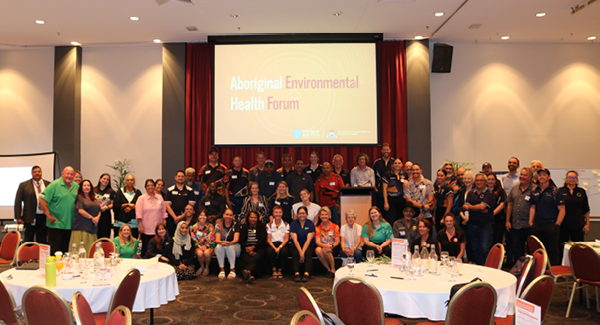
In March, AHCWA and the Department of Health hosted the Aboriginal Environmental Health Forum 2024 as part of the co-design process for the Model of Care. Almost 100 people from across the State attended the two-day forum to discuss how data is used in decision-making, what clinical environmental health referral systems work well, and what success looks like through community capacity building.
AHCWA is grateful to everyone who participated by sharing their knowledge, experience and insights. All this valuable information will be used to design an Aboriginal Environmental Health Model of Care to improve WA’s health outcomes.
Exciting Sexual Health Initiatives in Geraldton
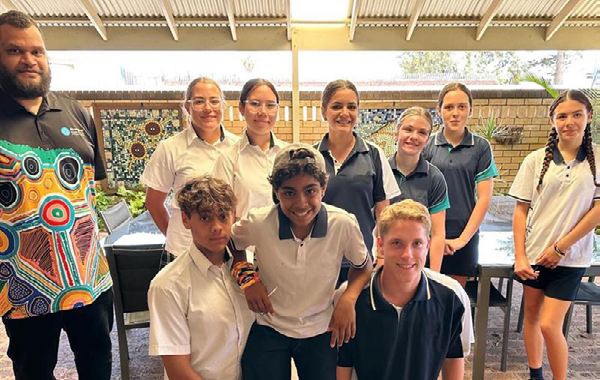
AHCWA’s Sexual Health and Blood Borne Virus (BBV) Program Officer, Ash (pictured), recently facilitated a dynamic Strength Based Messaging Workshop alongside the energetic youth of Geraldton. Together, they fine-tuned messaging in partnership with Yamatji Marlpa Aboriginal Organisation (YMAC), amplifying the voices of young leaders from the Yamatji community. With the involvement of our budding Young Leaders, mentored by AHCWA, this collaboration promises continued support for the vibrant youth community in Geraldton.
In addition, Ash participated in and delivered a presentation at the inaugural youth event, The Strong Blak Leaders Midwest Youth Forum 2024, hosted by Geraldton Regional Aboriginal Medical Service (GRAMS). The event witnessed significant participation from schools across Geraldton, with one school joining from Meekatharra. Furthermore, Ash led a breakout session featuring interactive activities from the Young Leaders Program. This session fostered meaningful engagement with the participants, facilitating discussions on crucial topics such as Mental Health, Alcohol and Drugs, Healthy Relationships, and Sexual Health.
Great start to the Family Wellbeing Program workshops
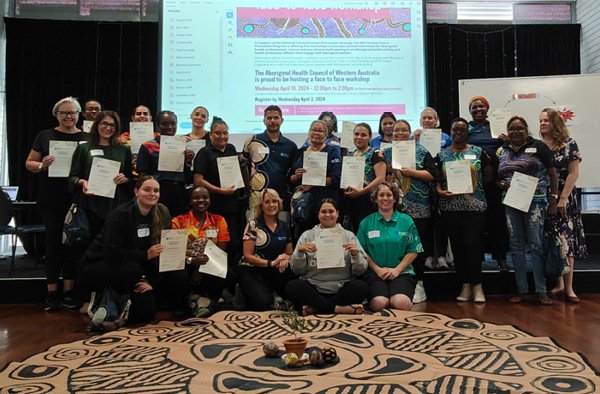
The family Wellbeing Team delivered their first Pilot women’s workshop to a fantastic group of 22 women from various services around the Perth metro area and the South West. A safe space was created for participants so that the Team could deliver the training appropriately. The content covered was about effective communication, understanding conflict, conflict resolution and the change process; it also included information centred around women and family domestic violence. The day covered valuable knowledge and skills, group work, hands-on activities and plenty of yarning .. we even had a few good laughs. We were extremely fortunate to have had such a powerful and resilient group of women who engaged in our workshop.
Some participant feedback included:
‘Excellent presentation and beneficial information.’
‘Very good for being the first one, glad to be a part of it, loved it.’
‘The videos were excellent, and I bought out the points. The presenters were fantastic. They were really well run by two professionals. Thank you.’
‘It was excellent.’
‘Very informative, insightful.’
‘Drama Triangle was new to me – thanks for sharing this framework.’
AHCWA will be rolling out these workshops across the regions. For more information (link to flyer chrome-extension://efaidnbmnnnibpcajpcglclefindmkaj/https://www.ahcwa.org.au/wp-content/uploads/2024/03/RTO_FWB_WorkshopsEOIFlyer_FEB24_WEB.pdf) about attending any of the Family Wellbeing workshops, please get in touch with Michelle michelle.delahaye@ahcwa.org or Brandon brandon.eades@ahcwa.org
You can register here for upcoming workshops.
Spotlight
Meet Jye, who is a Western Australian Aboriginal Health Ethics Committee (WAAHEC) Member
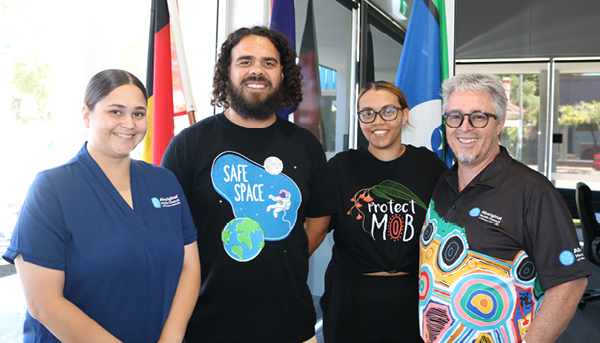
Where are you from? I’m a Gureng/Kanaka man from Bundaberg, southeast QLD.
What is your background? I have a background in youth work and health promotion. My current role is Sexual Health Education at Sexual Health Quarters (SHQ)
What is your role at WAAHEC? My role on WAAHEC is as a Community Member (appointed 2023) and previously as a Youth Member from 2019.
How long have you been with WAAHEC? I have been on WAAHEC for five years this year,
What are your main objectives and goals for 2024? Everything is relevant to the work that WAAHEC does to better the health of mobs. A holistic approach to things is the only way to see results and translate them into changes in diagnosis and treatment for Aboriginal health.
What do you enjoy about your role? Can you talk about the positive changes and impact you have witnessed at WAAHEC?
I plan to move up in roles at my organisation, becoming a coordinator of the Aboriginal education team. My role at WAAHEC has given me an insight into research that I would never have had the opportunity to get outside of the role. The things I have had to learn to understand applications have been more valuable than I could have imagined.
Australian Indigenous HealthInfoNet – State portal
Funded by the WA Department of Health, the Western Australian State Portal on the HealthInfoNet website is dedicated to information and resources specific to Aboriginal and Torres Islander health in WA.
The Western Australian State Portal, on the HealthInfoNet website, is designed to support the WA health sector by making information and resources specific to Aboriginal and Torres Strait Islander health in WA easily accessible. This video provides a short overview of the Portal, including an easy-to-follow demonstration on how to find information, refine searches and filter content by region using the interactive WA map. The Portal contains vital facts about Aboriginal people in WA and covers chronic diseases, infectious conditions, social and emotional wellbeing, populations, health system and determinants. Users can find publications, policies, resources, programs, organisations, and workforce information, including courses, events, funding opportunities and job vacancies. The Government of Western Australia funds the WA State portal.
A short, 2.5-minute video highlighting how to get the best use of the Western Australian State Portal on the Australian Indigenous HealthInfoNet website is now available.
Please take a look at the video here.
KAMS AFPP 1 year celebration
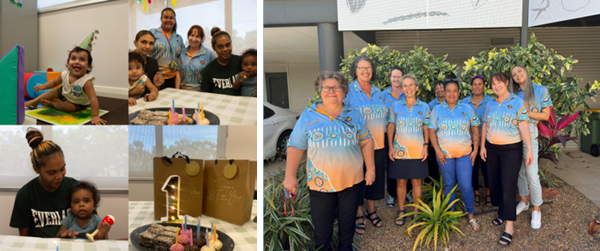
The Kimberley Aboriginal Medical Service Australian Family Partnership Program (AFPP) Team celebrates one year in early March since they enrolled their first client into the program and the milestones of two 1st Birthdays.
The AFPP team continue to provide comprehensive and goal orientated support to their clients who are enrolled by self referral. The Broome team is close to capacity with 17 clients enrolled stretching over Broome, Beagle Bay and Djarindjin Communities, and our East Kimberley team has 24 clients from Warmun, Frog Hollow, Halls Creek and Kununurra.
All mothers in the areas have shown great interest in the program and are invested in activities to help them through their pregnancy and parenthood journey.
Condom Dispenser Now Available
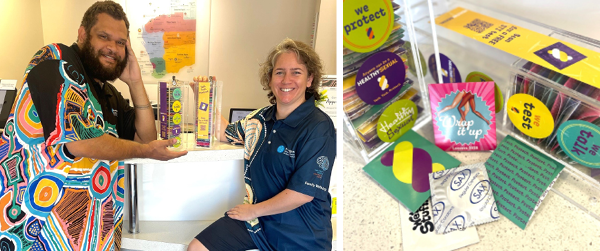
Exciting news! Thanks to the WA Department of Health, you can now easily access condoms through their brand new Condom Dispensers! The condom dispensers hold 50 condoms at one time and allow access to free condoms in community organisations.
We have created an expression of interest form for you here.
The Voices behind Ear Health’s Simon Says Booklets

Some of you may be familiar with our famous Simon Says Ear Health education booklets. The Ear Health team are in the middle of their newest Simon Says addition,, an animation showing the effects of Environmental Health. Keep an eye out on our website for more information on this exciting new resource.
WA Child Safe Project Geraldton Workshop
WACOSS invites you to the Geraldton Child Safe Organisation Workshop on Wednesday, 15th May, from 10:30 AM – 4:30 PM at the Multipurpose Centre.
This full-day training provides a holistic approach to creating and developing child-safe organisations. The training covers the National principles and delves deeper into what it truly means to be a child-safe organisation. Participants will gain valuable insights and knowledge to create a safe and protective environment for children under their care.
The training addresses the importance of adopting a ‘child safe culture’. Furthermore, the training is designed to equip attendees with a thorough understanding of the impact of child abuse and its long-term effect on children’s well-being. By raising awareness about these critical issues, participants will be better prepared to recognise and respond to potential risks, ensuring the safety and protection of children within their organisation.
It involves fostering a proactive and preventive mindset within the organisation. Participants will explore the fundamental principles and practices contributing to creating a child-safe environment.
Throughout the training, interactive activities, case studies, and group discussions will encourage participants to share their experiences implementing the National Principles and learn from others.
More information about WACOSS is here.
Making News Headlines
Kimberley Aboriginal Medical Services (KAMS) Board, representing Aboriginal community-controlled health services across the Kimberley region of WA, has released a media statement saying they stand against the push for more liquor restrictions without simultaneous investment in comprehensive alcohol and other drugs (AOD) services, planning and infrastructure. The media statement continues:
Every day, we see the harmful effects caused by alcohol misuse on Kimberley people, families, and communities and acknowledge proposals for further restrictions in Broome and Derby and changes implemented through the Liquor Control Amendment (Banned Drinkers Register (BDR)) Bill 2023. We recognise the devastating impact of alcohol but believe that simply increasing restrictions is not the answer. We do not oppose restrictions but emphasise the need for a holistic approach, combining health, social, and diversionary strategies to support community-led responses to alcohol related harm within the region.
Reform requires collaboration between Aboriginal and non-Aboriginal people, governments, and communities. Instead of more restrictions, governments must invest in our sector, specialist Aboriginal AOD services like Milliya Rumurra Aboriginal Corporation, and other Aboriginal Community Controlled Organisations (ACCOs) to enhance AOD services and develop comprehensive, practical approaches to alcohol problems, including alternatives to criminalisation.
Increased restrictions could unintentionally harm individuals and communities without adequate support, potentially leading to punitive outcomes rather than health improvements. The lack of a regional plan for alcohol and drug misuse, combined with insufficient resources for tackling related issues like family and domestic violence, demands urgent government action. Furthermore, the sensationalist portrayal of alcohol use in the region by the media contributes to a negative and harmful stereotype of this being “an Aboriginal issue”, underlining the need for an informed and respectful public discourse.
To view the KAMS media statement Call to Action: Liquor restrictions alone are not the answer. Governments must invest in regional health planning, services, capital infrastructure and workforce in full click here.

